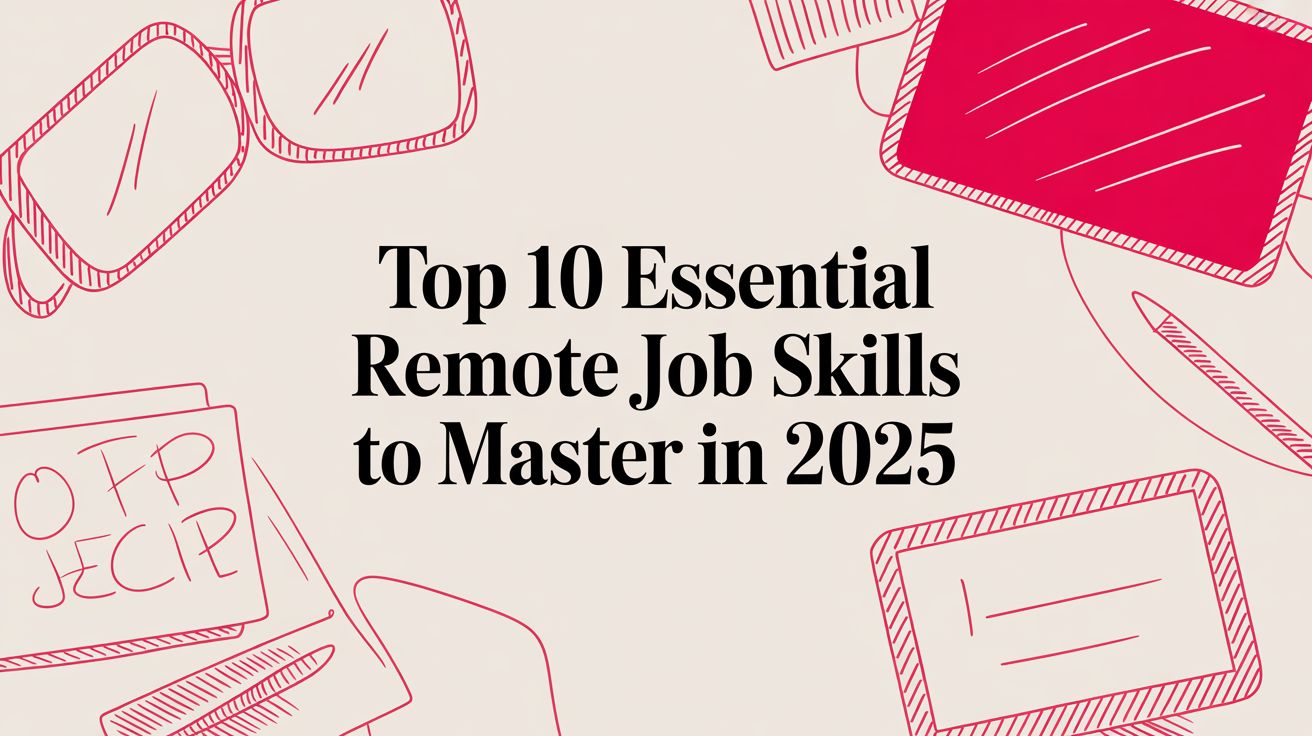Why Remote Job Training Changes Everything

Let’s talk about training for remote jobs. It’s a real game-changer. I’m not just talking about learning the ropes with Slack or Zoom (though those are definitely important!). It’s about fundamentally shifting your perspective on work itself. I’ve chatted with so many people who’ve transitioned from traditional office life to remote work, and the change in their mindset is incredible. They’re landing jobs around the world, negotiating better salaries, and building careers that actually fit their lives.
This transformation is so much bigger than just ditching the commute. It’s about developing a whole new skill set. Remote-trained professionals are often incredibly adaptable, resourceful, and excellent at client management. Why? Because they’ve learned to thrive in a self-directed environment.
Think about it: a traditional office worker runs into a problem, and their first instinct might be to pop over to a colleague’s desk. A remote worker, on the other hand, learns to anticipate those roadblocks and find creative solutions independently. They become proactive problem-solvers.
Good remote job training also addresses the common misconceptions about remote work. It clears up the myths and gives you a realistic picture of daily life outside the traditional office. This includes everything from setting healthy boundaries between your work and personal life to building genuine connections with colleagues across different time zones.
The need for this specialized training is booming. As of 2023, roughly 28% of employees globally worked remotely, up from 20% in 2020. This shows not just the rise of remote work itself, but the increasing need for specialized training to succeed in it. And the demand is only going to keep growing. Projections indicate that 32.6 million Americans will be working remotely by 2025. You can learn more about these remote work trends here. So, investing in high-quality training isn’t just a good idea; it’s essential. This isn’t a passing fad – it’s a fundamental change in how we work, and the right training unlocks its full potential.
The Skills That Actually Get You Hired Remotely

Forget randomly clicking on online courses. From analyzing countless job postings and chatting with recruiters, I’ve learned which skills really make a difference in landing a remote job. Tech skills are important, sure, but it’s more than that. It’s about what I call “async excellence.” Think asynchronous communication, project management, and building trust virtually.
Communication is Key in a Remote Setting
In remote work, most of your communication is written. This means your writing needs to be super clear, concise, and even anticipate questions before they’re asked. Can you explain complex things simply? Can you convey tone and empathy through text? These nuances are gold to remote managers. Knowing how to manage remote teams is critical, and resources like this on managing a remote sales team can be really helpful.
Project Management: Showing You’re Reliable
Remote work depends on trust. Managers need to know you can handle things independently. This means proactive planning, detailed organization, and transparent updates. Use project management tools like Asana effectively and communicate roadblocks before they derail things. Taking ownership shows you’re reliable and ready to handle remote work.
Collaboration Techniques for Distributed Teams
Collaboration changes in a remote setting. It’s about contributing meaningfully in virtual meetings, sharing information proactively, and connecting with colleagues you might never meet in person. Actively participate in online discussions, share helpful insights, and celebrate wins – even virtually. Make your presence known, no matter the distance. Checklists like this remote employee onboarding checklist can offer valuable insights for building strong remote teams.
Emerging Skills for Remote-First Cultures
As remote work becomes the norm, certain skills are becoming even more valuable. Virtual facilitation, or leading engaging online meetings and workshops, is in high demand. So is digital relationship building – creating a sense of community online. These skills show you’re not just surviving, but thriving in a remote environment.
To give you a better sense of what the market looks like, I’ve put together a table summarizing the most in-demand remote skills across different industries:
| Skill Category | Industry Demand | Average Salary Boost | Training Time |
|---|---|---|---|
| Communication (written & verbal) | High (across all industries) | 10-15% | Varies, ongoing practice is key |
| Project Management (Trello, Asana, Monday.com) | High (especially tech, marketing, project-based roles) | 15-20% | Several weeks to several months depending on the chosen tool |
| Collaboration & Teamwork (using tools like Slack or Microsoft Teams) | High (all remote-friendly roles) | 5-10% | Ongoing, focus on practical application |
| Virtual Facilitation & Online Meeting Management (using tools like Zoom) | Increasing demand (training, education, leadership roles) | 10-25% | Varies depending on experience and specialization |
| Digital Relationship Building | Growing demand (HR, community management, client-facing roles) | 5-15% | Ongoing, requires consistent effort and soft skills development |
As you can see, investing in these skill areas can not only increase your chances of getting hired but can also significantly impact your earning potential. Focus on the skills most relevant to your target roles and industries for maximum impact.
Creating Your Personal Remote Training Blueprint
Let’s be honest, most training programs for remote jobs fall flat. People try to learn everything at once and end up overwhelmed. I’ve seen it happen countless times. The truly successful remote workers I know? They don’t just collect random certificates. They build focused learning paths based on real career goals.
Here’s the framework I use myself and with my clients:
Honest Skills Audit: Seriously, be brutally honest. What are your true strengths? Where do you need to level up? Make a list of your existing skills and pinpoint those gaps.
Market Research: Time to see what employers actually want. LinkedIn and Indeed are your best friends here. Dive into job postings for the roles you’re targeting. Get a feel for the skills they’re demanding. A little market research goes a long way! Here’s a great resource on finding remote jobs: best way to find remote jobs
Realistic Timeline: Don’t try to become a remote work expert overnight. Break your training down into bite-sized pieces. Create a timeline that works for you, not the other way around.
Resource Allocation: Free resources are everywhere! Take advantage of them. There are tons of valuable online materials just waiting to be discovered. When you do invest in paid programs, make sure they offer a clear return on your investment.
Accountability & Tracking: Staying motivated is key. Set clear goals, track your progress, and find an accountability partner or a supportive community. And don’t forget to celebrate your wins – no matter how small!
 This infographic shows what an ideal home office setup can look like. It’s all about finding the sweet spot between comfort and functionality. When you’re training for a remote job, having a productive workspace makes all the difference. Notice how integrated technology is – things like dual monitors – they’re essential for a successful remote training experience.
This infographic shows what an ideal home office setup can look like. It’s all about finding the sweet spot between comfort and functionality. When you’re training for a remote job, having a productive workspace makes all the difference. Notice how integrated technology is – things like dual monitors – they’re essential for a successful remote training experience.
Training for remote jobs and technology go hand-in-hand. The remote workplace services market is booming. It’s expected to grow from $20.1 billion in 2022 to a whopping $58.5 billion by 2027. Naturally, investment in digital training platforms will follow suit, including things like AI-powered personalized learning and real-time feedback. Check out more remote work stats here.
Staying Focused & Motivated
Most training programs teach you what to do, but not how to actually do it, especially when it comes to the mental game. Succeeding in remote work requires a different kind of mindset.
Focus: Minimize distractions. Carve out a dedicated workspace, even if it’s just a corner of your kitchen table. Set clear boundaries between work time and personal time.
Motivation: Break down those big, daunting tasks into smaller, more achievable goals. Reward yourself when you hit milestones. Connecting with other remote workers can be a game-changer for support and encouragement.
Professional Identity: It’s easy to let professionalism slip when you’re outside a traditional office. Invest in your personal brand, build a consistent online presence, and get involved in relevant online communities. Remember, this isn’t just about learning new skills; it’s about building a sustainable remote career that aligns with your bigger goals.
Training Resources That Actually Work
Let’s be honest, I’ve wasted my fair share of money on online courses that promised the moon but delivered very little. So, let me save you the headache. I’ve seen it all – the good, the bad, and the truly awful training programs out there for remote jobs. After testing dozens myself and seeing what actually gets people hired, I’m here to share the real deal. Surprisingly, the most effective training isn’t always the most obvious. Forget the flashy bootcamps with hefty price tags; sometimes, the best resources are the specialized, under-the-radar programs that teach practical, real-world skills.
Finding the Hidden Gems
There are some absolute gems out there that employers actually notice on resumes. These programs often get overlooked because they’re not as hyped up, but they’re the ones consistently producing job-ready graduates. I’m going to give you my completely honest opinion on the popular training providers, including the pros and cons you won’t find in most reviews.
Evaluating Training Programs Like a Pro
More importantly, you’ll learn how to evaluate any training program you come across. I’ve put together a few key criteria to help you see past the marketing hype and figure out which courses are actually worth your time and money. This could save you months of frustration and potentially thousands of dollars wasted on ineffective training. For example, a good program should focus on practical application, provide personalized feedback, and connect you with a supportive community.
Mixing and Matching for Maximum Value
We all know training can be expensive. That’s why I’ll show you how to strategically combine free resources with paid programs to get the most bang for your buck. Think free webinars, online communities, and then supplementing those with targeted paid courses to learn specific skills. Get creative! Look into local workshops or networking events, too. You might find some really valuable resources right in your own community. For even more options, check out our detailed guide on remote work training.
From Certificates to Confidence
This isn’t just about finding a training program and checking a box. It’s about making sure that training translates into real career success. We’ll cover how to show off those new skills to potential employers and make yourself stand out as a top remote candidate. It goes beyond simply updating your resume; it’s about building genuine confidence in your remote work abilities.
To help you in your search, I’ve put together a comparison of some popular training platforms. This table gives you a quick overview of the costs, duration, certification value, and, most importantly, job placement rates.
Remote Training Platform Deep Dive Honest comparison of top remote job training resources with real placement data and cost analysis.
| Platform | Cost Range | Duration | Certification Value | Job Placement Rate |
|---|---|---|---|---|
| Example Platform A | $500 - $1,500 | 3 Months | High | 85% |
| Example Platform B | $1,000 - $3,000 | 6 Months | Medium | 70% |
| Example Platform C | $200 - $500 | Self-Paced | Low | 50% |
Remember, these are just examples and you’ll need to do your own research based on your specific career goals. Look at the table as a starting point for comparing options and digging deeper into each platform.
Everything I’m sharing is based on real experiences and proven results, not just theory. Get ready to level up your remote work game!
Mastering The Remote Work Mindset
This is where so many remote work training programs miss the mark. They focus on the how – how to use the tools – and completely forget the why behind embracing a remote lifestyle. After coaching hundreds of remote workers through this transition, I’ve noticed a clear pattern: those who struggle aren’t lacking technical skills. They’re grappling with the unexpected internal challenges – the isolation, the motivation dips, and even a shift in professional identity. Nobody prepares you for this stuff!
Mindset Shifts for Remote Work Success
So, what’s the secret sauce? What separates those who simply survive remote work from those who absolutely thrive? It all boils down to mindset. Here’s the truth:
Focus: Let’s be real, the couch is comfy, your dog is adorable, and that laundry pile…well, it’s always there. Successful remote workers create a dedicated workspace and set clear boundaries. Treat your workday like a workday, even if it’s happening two steps from your bedroom.
Meaningful Connections: Building relationships through a screen can feel strange at first. It requires conscious effort. Proactively jump into virtual conversations, join online communities, and schedule virtual coffee chats. Don’t underestimate the power of connection, even in a digital world.
Boundaries: Blurred lines between your work life and personal life are a one-way ticket to burnout city. Set clear start and end times for your day. Communicate those boundaries to your family or housemates. Protect your time – and your sanity! For more on this, check out this article on the challenges of remote work.
Mental Frameworks for Long-Term Success
Consider these your secret weapons for not just surviving, but truly thriving in the remote world:
Motivation: Long-term projects can feel incredibly draining when you’re working solo. Break down those large tasks into smaller, more digestible chunks. Celebrate the small wins along the way to keep your momentum going.
Combatting Loneliness: Working remotely can be isolating. There’s no water cooler chatter or impromptu hallway conversations. Schedule regular social interactions, even if it’s just a quick chat with a colleague. Finding online communities related to your work or hobbies can make a world of difference.
Professional Growth: The traditional office mentorship dynamic often disappears in remote work. You have to be proactive. Seek out online mentors, join professional organizations, and participate in virtual conferences. Take ownership of your professional development.
This isn’t just some feel-good advice; these are practical strategies, backed by research and honed by people who have successfully built remote careers. Speaking of research, it’s worth noting that 31% of fully remote workers report high engagement, compared to just 23% of hybrid workers. This really underscores the importance of training programs that address mental well-being in remote settings. You can learn more about this here. Mastering this mindset gives you a massive advantage that most remote workers never even think about. It’s not just about the skills; it’s about building the mental resilience you need to thrive in this new world of work.
Proving Your Remote Readiness To Employers
You’ve put in the work to train for remote jobs—now it’s time to make sure employers see the value you bring. So many people treat training like a box to check, but it’s so much more than that. Think of it as a superpower, and I’m here to show you how to use it. After helping tons of people land remote roles, I’ve learned what truly grabs a hiring manager’s attention.
Showcasing Your Remote-Specific Skills
This isn’t just about knowing how to use Zoom; it’s about showing you can truly thrive remotely. Think of your portfolio as a way to spotlight your remote-specific skills:
Asynchronous Communication Mastery: Show off projects where crystal-clear written communication was key. Maybe it was a successful email campaign, a meticulously documented project plan, or concise reports that got right to the point.
Independent Project Management: Highlight times you managed projects from A to Z with minimal supervision. And don’t forget the numbers! Did you come in under budget? Ahead of schedule? Those details make a difference.
Virtual Collaboration Prowess: Demonstrate your ability to work smoothly with remote teams. Did you lead a virtual meeting that led to a big decision? Facilitate a productive online brainstorming session? These are the kinds of examples that speak volumes.
Speaking the Language of Remote Hiring
Your resume needs to speak directly to what remote hiring managers are looking for. Here’s how:
Keywords: Weave remote-work keywords into your resume and cover letter. Terms like “remote work experience,” “virtual collaboration,” “project management,” and “asynchronous communication” will make you stand out.
Quantifiable Results: Don’t just list your training; show the impact. For instance, instead of “Completed project management training,” try “Implemented project management strategies that shortened project timelines by 15%.” See the difference?
Compelling Storytelling: Think of your training as a story, not just a list of certificates. How did your training directly improve your remote work performance? Tell that story!
Here’s a snapshot of a LinkedIn profile summary that nails it: This profile clearly shows experience managing remote teams and projects and uses keywords recruiters are actively searching for. The quantifiable results add that extra layer of credibility.
Developing a remote work mindset also includes finding and presenting your professional brand. Figuring out how to find your personal style can really help with that. And don’t forget to practice those virtual interview skills! Check out our guide on virtual interview tips for more on that. Remember, proving you’re remote-ready is all about showing you can flourish in a distributed environment, not just get by.
Your Remote Career Action Plan
Let’s get down to brass tacks and create a plan you can start working on today. This isn’t just a recap; think of it as your personalized roadmap to turn training into a remote career. I’ll give you realistic timelines and milestones, whether you’re just starting out or an experienced remote worker.
New to Remote Work?
If remote work is brand new territory, the first thing to do is build a solid foundation. Spend your first two weeks getting comfortable with the essential skills of remote work, like asynchronous communication and project management. There are tons of free resources online to help you with this. Use this time to also explore different remote roles and figure out which skills are most in demand. Sites like Remote First Jobs can give you a good feel for what’s out there.
Once you’ve got a lay of the land, dive into some free or low-cost training opportunities during month two. I’d recommend focusing on just one or two key skills at first, so you don’t get overwhelmed. It’s also a good time to start building your network. Join online communities that are relevant to your target roles.
By month three, you should be aiming to wrap up a beginner-level course or even a certification program. Start tailoring your resume and portfolio to showcase those shiny new remote-ready skills. Applying for entry-level remote positions or internships is a great way to get some real-world experience under your belt.
Experienced Remote Worker?
Already working remotely? Awesome! Your action plan is all about strategic upskilling. Dedicate the first week to a serious self-assessment of your skills. Think honestly about where you see gaps and what skills would really help you level up.
Your second week should be all about market research. Check out advanced job postings on sites like Remote First Jobs in your field. What skills are employers looking for in senior roles? Are there new technologies you need to learn? Get a feel for where the market is heading.
Over the next two months, zero in on specialized training. It might be worth investing in a high-quality course or certification that directly addresses the skills gaps you’ve identified. Make sure your online presence reflects your increased expertise and don’t forget to network strategically with leaders in your field.
This roadmap gives you practical steps to build your remote career, no matter your experience level. Ready to find the perfect remote opportunity for you? Check out the thousands of remote jobs on Remote First Jobs today!






